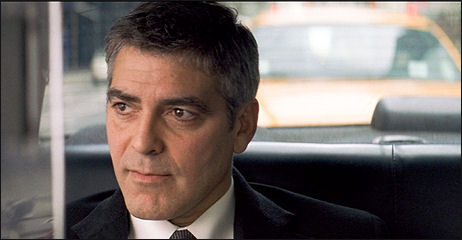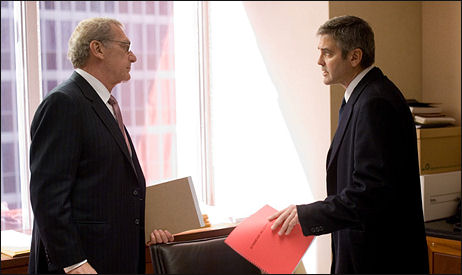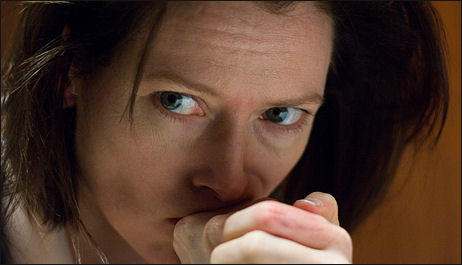If your idea of a really great film was Michael Bay‘s Transformers, don’t even go to Tony Gilroy‘s Michael Clayton (Warner Bros., 10.5). It’s just not your speed. And I’m not even referring to the fact that some theatres will be asking customers to flash college diplomas before selling them tickets next weekend, and that people with Masters Degrees will be given preferential seating. It’s just not violent or mechanical enough, and there are no jokes about E-Bay and no Shia LeBouf– type guys running around acting lively and endearing.

For a while there I was in trouble myself. I love films like Michael Clayton — I love their moody efficiency — and even I missed a couple of things the first time around.
But it plays superbly the second time. Seriously — this is one of those films that you’ll like (or value) a bit more when you catch it again on DVD in early ’08. I caught it a second time at a plush little screening room in Toronto and came out doubly-pleased. I’m only sorry I wasn’t quite smart enough to enjoy it as much the first time. Plus it has, by my sights, one of the coolest, most stylishly uptown closing-credits sequences I’ve seen in ages. (Which I’m not going to describe.)
Michael Clayton is an assured, tightly written, very well acted moral drama about amoral corporate maneuvers. It’s about the cost of being an amiable can-do guy — the title character played by George Clooney — in this kind of toney and corrup- ted environment.
This is the kind of sturdy, well-honed drama Sydney Pollack (whose performance as a cynical, world-weary law-firm chief is slightly better than Clooney’s, even though he’s strictly supporting) used to direct in the ’80s and ’90s. It’s also a little bit like Roger Michell‘s Changing Lanes, only it doesn’t have as many popcorn- payoff moments.

Howard Hawks once said that a movie will always succeed as long as it has…I forget, two or three or four great scenes (and as long as the rest of the film holds its own). Lanes had four or five great scenes. Clayton has two — one at the very end with a line that invokes the name of a certain spiritual diety in India, and one involving the quietly efficient killing of a man without the usual histrionic crap that all dramas go in for when a character violently buys the farm. There’s also a very cool, quiet-down, early-morning scene between Clooney and three horses shot somewhere in Westchester County, so make it three.
The fact that Clayton doesn’t have what you might call a heavily-beating pulse is okay…really. People in corporate realms aren’t much for that sort of thing. The only guy who really lets loose with serious fire (besides Clooeney and Pollack, I mean) is Tom Wilkinson, playing a brilliant litigator who’s lost patience and possibly his mind (certainly his lawyerly bearing and emotional composure) after defending a huge plant-pesticide or plant-growing company called U/North in a class-action suit for several years.
And yet it’s always “on the case” and never boring. The material that Gilroy, the director-writer, runs with feels as seasoned and authentic as this kind of thing can be. There’s no shovelling — no “oh, come on…give me a fucking break” moments whatsoever.
Clooney’s title character is a “fixer” for a large Manhattan law firm called Kenner, Bach & Ledeen. He basically puts out fires for the firm. He facilitates, cajoles, finagles, paves over. He calls himself a “janitor,” and the fact that he’s never been made a partner tells you that his colleagues more or less agree.

Grappling with debt, a gambling problem and family issues (a fuck-up brother, a son he’s trying to be close and steady with), Clayton is asked early on to clean up a mess after Wilkinson’s Arthur Edens suffers a freak-out (rips off his clothes, babbles excitedly, scares people) in some Midwestern state while taking a deposition in the U/North case.
Clayton is initially appalled at — frightened by — Arthur’s behavior, but gradually learns that his craziness is based upon righteous disgust at the malfeasance he’s been spinning all these years, having come upon damning evidence of corporate guilt in the deaths and illnesses of U/North customers.
When U/North’s frosty top counsel (Tilda Swinton) discovers that not only Eden but Clayton are onto this, she does what all morally deficient can-do types in films of this sort do — she hires a couple of low-key hitmen to shut them up. Clayton, at the same time, is gradually coming to the end of his janitor trip and, by and by, a kind of epiphany.
Taking place over three or four days and told largely in flashback (although it doesn’t skip back and forth in any kind of irritating fashion), the movie is, truth be told, a little hard to follow at times. But like I’ve said, it’s beautifully spoken — Gilroy is a master at measured, just-right dialogue that’s the opposite of purple — and it’s my kind of adult moral thriller. And I absolutely loved that Swinton lets her flabby stomach be part of a getting-dressed scene. It’s just a little too dry and cultivated for the Cabo San Lucas T-shirt crowd.

